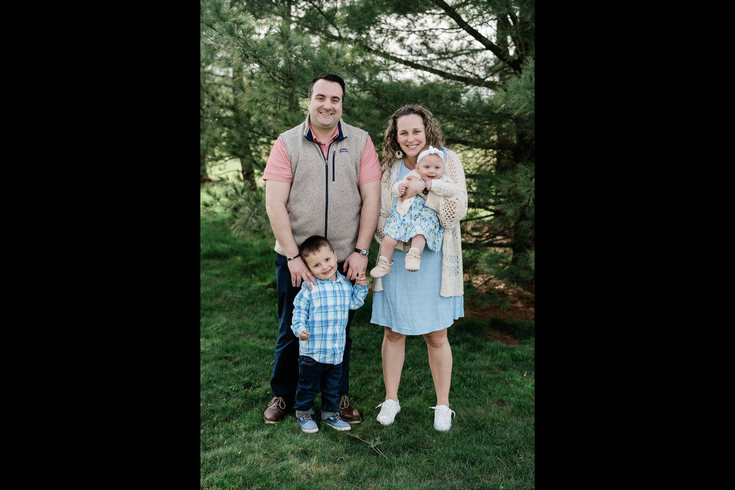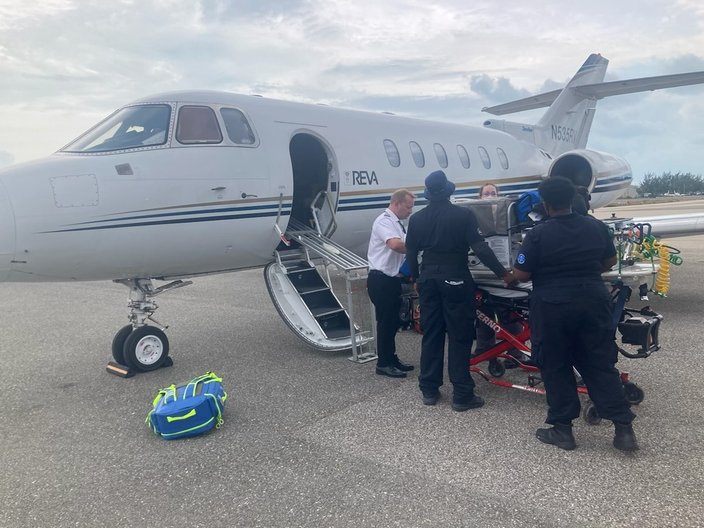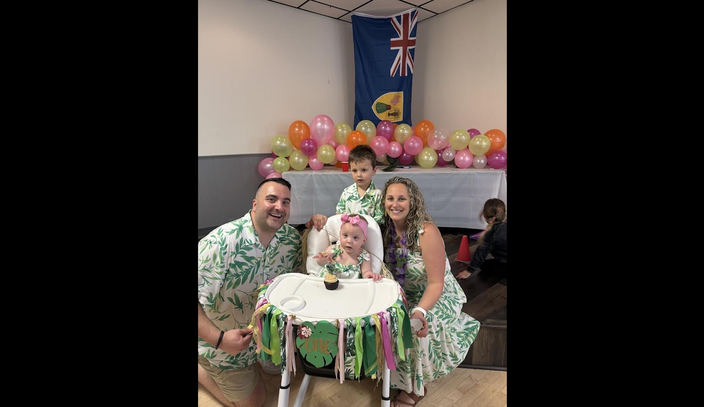
June 06, 2024
 COURTESY/The Offner Family
COURTESY/The Offner Family
Logan Offner, now 1, was born unexpectedly and prematurely at 27 weeks while her parents, Lindsey and Joe were on vacation in Turks and Caicos in May 2023. A CHOP emergency transport team brought Logan home for treatment. Now Logan and her brother Cole, 3, are thriving, pictured here in May with their parents.
Lindsey and Joe Offner were taking a quick vacation to Turks and Caicos last year before they welcomed their second baby.
Lindsey, who works in health benefits consulting, had had a smooth pregnancy and delivery with their first child, Cole. Her second pregnancy was progressing just as well – until Lindsey unexpectedly went into labor on May 12, 2023, delivering a 2.5-pound baby girl named Logan at 27 weeks gestation.
"The medical care we had in Turks was amazing," said Lindsey, who lives in Langhorne, Bucks County. "They took such good care of me, and honestly, they saved (Logan) and kept her stable."
Because she was so premature, Logan needed a higher level of care than the island hospital could provide, and the family needed to get home. Joe, a project manager for a pharmaceutical company and a volunteer firefighter in Feasterville, is "very good in traumatic situations," Lindsey said. "He basically went into fight-or-flight mode."
Joe called the Children's Hospital of Philadelphia and asked the operator and for the emergency transport team.
"The doctor was like, 'I'm sorry, who are you?'" Lindsey recalled. "My husband was like, 'I just had a baby in Turks and Caicos, and we need to get her off the island!'"
Fortunately, CHOP was able to respond, and a small airplane manned by a CHOP transport team arrived May 14, 2023 — Mother's Day — to pick up baby Logan and Joe. Lindsey, who had had an emergency Cesarean section less than two days before, had to take a commercial flight back to Philadelphia the same afternoon.
"I didn't have another choice," Lindsey said. "I was doubled over on the plane, but I needed to get out of the country. … Basically everybody knew my story by the end of the flight, because I was just sobbing."
CHOP's emergency transport team flew to Turks and Caicos in May 2023 to bring Logan Offner, now 1, to the Philadelphia hospital for treatment after she was born prematurely while her parents were vacationing.
CHOP's emergency transport operation has about 50 people who comprise up to six teams at any time and its own fleet of ambulances. CHOP completes about 100 to 150 medical patient transports by helicopter a year within about a 150-mile radius of Philadelphia.
The transport teams also pick up patients at regional airports who are coming from all over the world for treatment at CHOP. In addition, the teams conduct between 50 to 60 plane transports a year, carrying patients from all over the country to and from CHOP.
Only about once a year does CHOP pick up a sick child in another country by emergency transport for treatment in Philadelphia.
Working in emergency transport is "not for everybody," said Dr. Nicholas Tsarouhas, senior medical director of CHOP's transport team and an attending physician in the emergency department.
"You're in a helicopter or an airplane, and it's you and your partner with a critically ill patient, and you don't have backup, and you don't have calmness around you," Tsarouhas said. "You have a loud helicopter. You have an airplane that is shaking around, and you're trying to manage a critically ill baby, to listen to heart sounds and breath sounds, and if there's a decompensation, it's really you and your partner.
"You've got the life of a child, a baby in your hands, literally."
Logan Offner celebrates her first birthday with her parents, Joe and Lindsey, and her older brother, Cole, in May. A Turks and Caicos flag hangs behind them. Logan was born prematurely in the British territory while her parents were vacationing last year.
After landing safely in Philadelphia, Joe and Lindsey met up with Logan in the neonatal intensive care unit, where CHOP neonatologists cared for her for more than 70 days before she went home. Because Logan was born at 27 weeks, and babies' lungs don't fully develop until 36 weeks gestation, she needed to be on a ventilator.
"I said, 'Joe, you hold her first. You got us here.'" Lindsey said. "And as he was holding her, my crazy daughter ripped out her own ventilator. … And the doctors were like, 'Um, well, we were going to do this in a safe and clean environment tomorrow.' But she decided today was the day, and she never went back on the ventilator.
"I think we were the only people in the NICU that actually were so happy to be there, which is such a weird thing to say," Lindsey said. "But we were so happy to be there, because she was alive and taken care of by CHOP doctors."
Logan, now 1, is thriving alongside her brother, Cole, 3.
Looking back at the past year, "I think we're better people for it. It's allowed us to really take a step back and give other people more grace," Lindsey said.
"When I was walking around town as a shell of a human when my daughter was in the NICU, and I was recovering from a C-section, people were just nice to me, and it's kind of helped me realize – we don't know what people are going through. No one knew what I was going through, and they were nice, and I just remember those things."
 COURTESY/The Offner Family
COURTESY/The Offner Family Courtesy/The Offner Family
Courtesy/The Offner Family